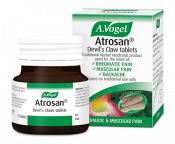1) Meditation and deep breathing

It is thought that being in a relaxed state helps us to manage pain better. One study found that perception of pain was significantly reduced after practicing mindful meditation daily for 20 minutes at a time.1
Deep breathing helps to soothe your parasympathetic nervous system and prevent your flight-or-fight response from reacting to the pain. Meditation and deep breathing techniques also help to reduce stress which can contribute to the amount of pain we experience – why not check out our breathing tips to reduce stress?
Your emotions can play a big part in your experience of pain, according to a study carried out in 2013 high levels of stress could lead to increased vulnerability to pain.2 When we are stressed our body’s repair functions are suppressed because our body is choosing to respond to the stressful stimuli rather than responding to our body’s inflammation. What’s more, large amounts of the stress hormone cortisol can also block bone growth by obstructing calcium absorption which then inhibits bone cell growth.
2) Listen to music
This is not technically a pain relief strategy as it is a distraction strategy however, it can be surprisingly effective. Music is thought to enhance our physical, psychological, cognitive and emotional functioning as well as being able to decrease our pain perception.
Research has found that chronic pain patients who listened to music for just one hour daily could experience a significant 21% drop in pain.3 If music isn’t so much your thing, you can achieve similar effects by distracting yourself in other ways such as completing memory challenges.
3) Massage
Massage therapy is thought to help boost levels of endorphins and serotonin which are our body’s natural painkillers that play an important role in regulating our mood too. Massage targets the deeper layers of muscle and connective tissue to stimulate nerve fibres and reduce pain messages that are relayed to and from the brain.
According to the Arthritis Foundation, a 2006 study found that those with osteoarthritis of the knee benefited from reductions in pain, stiffness, function, range of motion and walking as a result of receiving a massage.4
4) A good night’s sleep

Unfortunately, pain and poor sleep are a duo that like to cause mischief and mayhem! When we sleep our body repairs tissues and secretes anti-inflammatory molecules, getting enough sleep is thought to help decrease inflammation in the body. Research has found that, as well as benefiting our memory, mood and weight, sleep can also decrease our pain sensitivity.5 What’s more, sleep deprivation can result in an increased production of inflammatory chemicals called cytokines.
Sleeping better however, is often easier said than done – particularly where pain is involved! Often we can feel like it is a vicious cycle where lack of sleep increases your sensitivity to pain and your pain keeps you from getting enough sleep. For more information on how pain can impact our sleep check out Marianna’s blog ‘Is poor sleep making you more sensitive to pain?’ and try out some of my tips below to help you sleep better with your pain.
• Make sure you have a comfortable mattress – a firmer mattress can often provide a little bit more support than a softer one
• If you have neck pain sleep with one pillow rather than two to keep your neck in the most neutral position that you can. This will help to avoid extreme rotation and overextending
• Try a natural sleeping aid like Dormeasan which, unlike conventional sleeping pills has no nasty, drowsy side effects
• Refrain from using screens in the run up to bedtime and, if you absolutely must use them, incorporate a blue light filter into your electronic settings
• Make sure you don’t have caffeine too late in the day. Surprisingly, caffeine can actually stay in your system for quite a long time – anywhere between 4 and 6 hours – so bear this in mind!
5) Turn to natural remedies
 Nature is packed full of weird and wonderful things that can help to support our overall health and wellbeing. Choosing natural, herbal remedies rather than conventional painkillers can have massive benefits for our body. Herbal remedies are composed of completely natural ingredients and so do not have the same unpleasant side effects that can crop up with conventional painkillers.
Nature is packed full of weird and wonderful things that can help to support our overall health and wellbeing. Choosing natural, herbal remedies rather than conventional painkillers can have massive benefits for our body. Herbal remedies are composed of completely natural ingredients and so do not have the same unpleasant side effects that can crop up with conventional painkillers.
What’s more, herbal remedies come in a variety of shapes and forms so it’s easy to find one that works best for you. If you don’t like tablets then I’d suggest trying an oral tincture such as our own Devil’s Claw. This tincture not only helps to soothe inflammation naturally by the actions of the root of the herb devil’s claw, but it is also fast acting. The liquid format is quick absorbing directly into the bloodstream and it doesn’t need to be digested by the stomach first in the way that tablets do.
6) Omega-3 fatty acids
Healthy fats, such as omega-3 fatty acids, reduce inflammation and swelling thus reducing pain. One study found that omega-3 fish oil supplements had an equivalent effect in reducing arthritic pain to that of traditional NSAID painkillers.6 Omega-3 is thought to have this beneficial effect as a result of a compound called resolvins which help to bring the inflammatory process to an end. They are also thought to help shift inflammatory prostaglandins that increase inflammation to those that lessen it.
You can easily find omega-3 through your diet, it is found in foods including oily fish like salmon or mackerel, walnuts, flaxseeds, chia seeds and hemp seeds. For more information about omega 3 check out our blog ‘What are omega fatty acids?’
7) Herbs, spice and all things nice!

There are many herbs and spices out there that have been traditionally used to help relieve pain, many are still regularly used today and can easily be incorporated into your diet through cooking. Many of these wonder herbs and spices are thought to be effective for pain relief by helping to block enzymes that stimulate inflammation. Use fresh herbs whenever you can as these contain more antioxidants than dried varieties.
• Turmeric – contains curcumin, an antioxidant that helps to protect the body from free radical damage
• Ginger – a natural anti-inflammatory that is beneficial for digestion, nausea as well as pain relief
• Cayenne – cayenne contains capsaicin which helps to alleviate arthritic type pain
• Garlic – due to its high selenium content and a component called thiacremonone garlic helps to inhibit inflammatory responses in the body
• Tart cherries – cherries ease pain by inhibiting COX enzymes that trigger the production of inflammatory compounds. What’s more, cherries are abundant in flavonoids and antioxidants (which is what gives cherries their rich red colouring) which can help to curb pain.
8) Keep active

Now keeping active is one of my top recommendations when it comes to pain relief – but why? Well, although you might think that moving more will make your pain worse it can actually have the opposite effect. Exercise triggers the release of endorphins which not only make us feel good on an emotional level, but also act as our body’s natural painkillers. Endorphins work to block our perception of pain by binding to opioid receptors in the brain in a similar way to oxycodone and morphine, so stimulating these friendly little hormones may just provide you with some much-desired pain relief!
1 https://www.spine-health.com/blog/mindful-meditation-vs-chronic-pain
2 https://www.sciencedaily.com/releases/2013/02/130225092038.htm
3 http://blog.case.edu/case-news/2006/06/29/listening_to_music_can_reduce_chronic_pain_and_depression
4 https://www.arthritis.org/living-with-arthritis/treatments/natural/other-therapies/massage/massage-benefits.php
5 https://www.huffingtonpost.com/2012/12/06/sleep-pain-tolerance-sensitivity-duration-time_n_2219869.html
6 https://www.ncbi.nlm.nih.gov/pubmed/16531187








